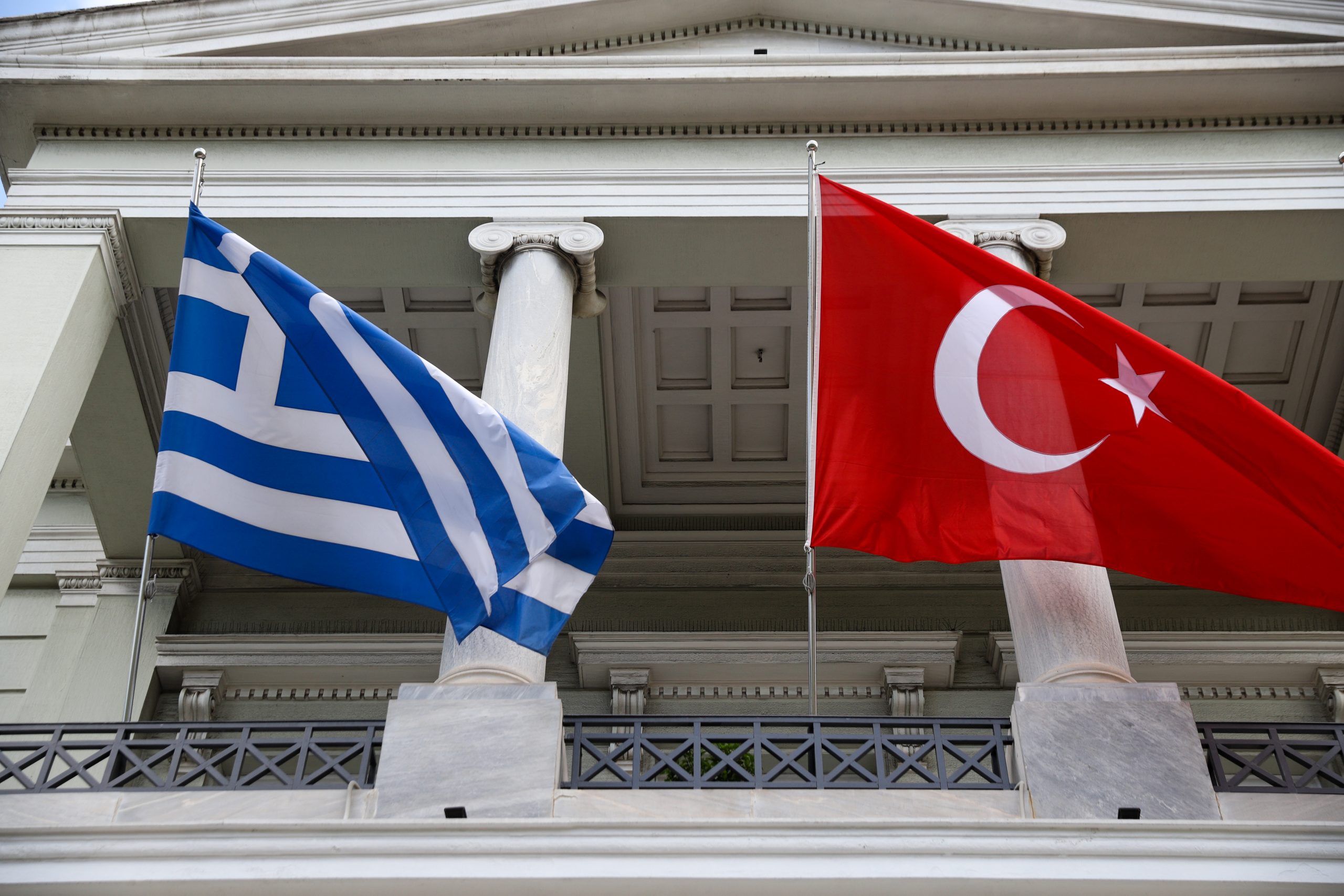
This time a year ago, the two countries were already in their third year of tensions stemming from Ankara’s revisionist power politics. Given that 2023 was an election year in both countries, there were many who thought that the situation could go off the rails and develop into a major crisis or even a hot episode. In fact, the exact opposite happened. The past year was one of the calmest in Greek-Turkish relations, with the rapidly improving bilateral climate culminating in the recent High Cooperation Council meeting and the adoption of the Athens Declaration. Which goes to show that it is impossible to make predictions with any certainty in multifactorial situations such as international relations.
To a large extent, Turkey’s volte face can be ascribed to three factors:
- Erdoğan realizing that his aggressive and revisionist policy in the Eastern Mediterranean was not yielding anything worthwhile (except in the “special” case of Libya). In fact, it had backfired by creating friction with countries in the region and with the West. The rallying of neighbouring states against Turkish aggression was also consigning Turkey to the sidelines. As far as the tensions with Greece in particular were concerned, the policy had proved counter-productive: while Turkey had failed to gain any tangible benefits, it had been denied both congressional approval for the modernization of its F16 fleet, an unprecedented development, and permission to purchase Eurofighters, thanks to a veto by the German Chancellor;
- The ongoing war in Ukraine, the repudiation of all forms of revisionism by the Western allies, and Turkey’s difficult position within the Atlantic Alliance in the wake of its attempts to blackmail NATO over Finland and Sweden’s applications to join the Alliance and Ankara opting not to apply sanctions against Russia; and
- Turkey’s economic problems, which had been aggravated by the earthquake, and Ankara’s consequent need to improve relations with the West, primarily with a view to securing funds with which to get the economy back on its feet and reconstruct the areas struck by the quake. Greece’s immediate response and assistance with the rescue efforts also played an important, albeit auxiliary, role.
So relations between the two countries are volatile, multidimensional and currently playing out on three partly-intertwined levels. Given how the two countries are bound together by their geography, history and joint participation in the Atlantic Alliance, Turkey is at one and the same time Greece’s “ally” and a potential economic and trading partner, but also a strategic competitor in the context of Ankara’s revisionism.
The first two levels are specified and prescribed in both the Confidence Building Measures (CBMs) and the “positive agenda”. However, the third level, which is where the hard core of the tensions resides, is far more dangerous and tricky to address. We are still in the very early stages of the process, and the two countries do not seem for now to agree on either the number or type of disputes they are being invited to resolve. It therefore remains to be seen whether the first two strands will facilitate a joint approach to the third, or serve as bulwarks to prevent relations being derailed by the nations’ systemic rivalry.
Against this backdrop, the “Athens Declaration” is significant on multiple counts: though not legally binding, it produces a powerful political commitment not to rock the boat—for the near future, at least. This gives Greece the space and time it needs to strengthen various aspects of its power which had fallen behind as a result of the economic crisis and/or long-standing pathologies. At the same time, it provides both countries with much-needed calm and stability, given their geographical proximity to loci of instability and the more generalized international disorder. Stability is also crucial at this stage in the light of changes within the international system, the uncertainty of the outcome of the 2024 US elections, and the inherent weaknesses of the EU.
However, with a period of calm ensured and the risk of conflict removed, international interest in resolving Greek-Turkish issues will diminish. Turkey will be able to negotiate a new customs union with the EU or upgrade its air force not as a threat but as a partner of Greece. The Athens Declaration commits the two countries to avoiding unilateral acts, while also favouring the maintenance of the status quo. It is a mutually beneficial quasi-moratorium. Given that fossil fuels are increasingly unlikely to be exploited (especially after COP 28), Turkey’s continental shelf is no longer a powerful incentive for Ankara to delimit its maritime zones, especially since the status quo is currently in its favour. Because any settlement of the continental shelf and EEZ disputes, however favourable to Turkey, would entail a smaller area of international waters being available for operational training and fishing.
To convince/pressure Turkey into agreeing to a solution, Greece will therefore need to develop a comprehensive strategic plan and involve the EU and our strategic partners in its drafting, however much Turkey does not want third-party ‘interference’ in our bilateral relations. An agreement will require a great deal of effort, some tough decisions, realism, bipartisan consensus and time—lots of it—to achieve. Otherwise, the political dialogue and exploratory contacts will once again reach an impasse.
So, all the signs indicate that 2024 will be a period of calm for Greek-Turkey relations, though not the year in which the issues fuelling tensions between the two nations will finally be resolved. Even in a best case scenario, a solution is expected to take longer to achieve. The only thing that could disturb this calm, barring some unexpected development, would be a deterioration in the Cyprus issue that prompted Turkey to fall back on provocations. Should the dialogue on Cyprus resume, however, it would help to consolidate and sustain the current positive climate.
Alexandros Diakopoulos, Konstantinos Filis, Kostas Ifantis, Petros Liakouras
This article is part of the annual Special Edition “ELIAMEP Outlook – Predictions for 2024”, where ELIAMEP’s leading analysts and associates share their predictions for the year ahead. They assess the main challenges, trends, risks, potential opportunities and inflection points of 2024 for Greece, Europe, the Mediterranean and the world.
Source: tovima.com
Latest News

DM Dendias: We talk With Turkey But We Always Bring Up Their Unacceptable Positions
Second and last day of closely watched conference, entitled 'Metapolitefsi 1974-2024: 50 Years of Greek Foreign Policy', also included appearances by PM Mitsotakis, Ex-PM Tsipras and PASOK leader Nikos Androulakis, among others

Rhodes Airport Tops Fraport Greece’s Regional Airports in 2024 Performance
According to Fraport's data, more than 35 million passengers (specifically 35.2 million) were handled by Fraport-managed airports during the 11 months.

European Central Bank Cuts Interest Rates by 25 Basis Points
It is the fourth cut of interest rates by Europe’s central bank, a move expected by the markets and financial analysts leading to the rate settling at 3%.

Airbnb: New Measures Add €600 in Extra Costs for Property Owners
Property managers face an immediate administrative fine of 5,000 euros if access to the inspected property is denied or any of the specified requirements are not met.

Economist: Greece Included in the Best Performing Economies in 2024
Meanwhile, Northern European countries disappoint, with sluggish performances from the United Kingdom and Germany.

EasyJet Expands Its Routes from Athens
The airline’s two new routes will be to London Luton and Alicante and they will commence in summer 2025.

Capital Link Forum Highlights Greece’s Economic Resurgence; Honors BoG Gov Stournaras
Capital Link Hellenic Leadership Award recipient, Bank of Greece Gov. Yannis Stournaras, an ex-FinMin, was lauded for his pivotal role during Greece’s economic recovery

Tourist Spending in Greece Up by 14%, Visa Card Analysis Shows
Greece’s capital Athens emerged as the most popular destination, recording a 17% increase in transactions with Visa cards, surpassing even the cosmopolitan island of Mykonos.

Inflation in Greece Unchanged at 2.4% in Nov. 2024
The general consumer price index (CPI) posted a 0.4% decrease in November compared to the previous month

2024 Christmas Holidays: Extended Shop Hours Schedule
The 2024 Christmas Holidays extended shop hours schedule commences on Thursday, December 12 and runs until the end of the year.


![Φυσικό αέριο: Δυναμικό come back του LNG στην Ελλάδα [γραφήματα]](https://www.ot.gr/wp-content/uploads/2023/01/OT_naturalgas-90x90.jpeg)












![Fraport: Πάνω από 35 εκατ. επιβάτες στα αεροδρόμια το 11μηνο – Πτώση στη Μύκονο [πίνακας]](https://www.ot.gr/wp-content/uploads/2022/06/fraport-90x90.jpg)


























 Αριθμός Πιστοποίησης Μ.Η.Τ.232433
Αριθμός Πιστοποίησης Μ.Η.Τ.232433